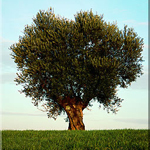8 But I am like an olive tree
flourishing in the house of God;
I trust in God’s unfailing love
for ever and ever.
9 I will praise you forever for what you have done
in your name I will hope, for your name is good.
I will praise you in the presence of your saints.—The words of King David from Psalm 52:8-9
Lots of comedians have made a good living creating jokes about some of the trends in Human Resource Development. I will freely admit that the geeky bunch that often seems to inhabit the tiny cubicles of most Human Resource Departments may well have rightly earned the barbs sent their way. Many in HR seem have have an air of superiority. This attitude may come from an ever-changing landscape of quick solutions and pseudo-psychological popularized techiques intended to eke out the most productivity from the workers of a business.
Out of this environment come the jokes that center around an imaginary job interview where a bespectacled HR person asks, "If you were a tree, what tree would you choose to be?"
King David would not have to think very hard to answer that question. In the Scripture passage at the beginning of this blog post, he chooses to declare that he is an olive tree. Olive trees play a significant part in Scripture. We here in the west know very little about olive trees.
That great fountain of modern encyclopedic knowledge, Wikipedia, declares:
| The olive tree, Olea europaea, is an evergreen tree or shrub native to the Mediterranean, Asia, and Africa. It is short and squat, and rarely exceeds 8–15 metres (26–49 ft) in height. The silvery green leaves are oblong, measuring 4–10 centimetres (1.6–3.9 in) long and 1–3 centimetres (0.39–1.2 in) wide. The trunk is typically gnarled and twisted. |  |
| The small white, feathery flowers, with ten-cleft calyx and corolla, two stamens and bifid stigma, are borne generally on the previous year's wood, in racemes springing from the axils of the leaves. The fruit is a small drupe 1–2.5 centimetres (0.39–0.98 in) long, thinner-fleshed and smaller in wild plants than in orchard cultivars. Olives are harvested in the green to purple stage. Canned black olives may contain chemicals (usually ferrous sulfate) that turn them black artificially. Olea europaea contains a seed commonly referred to in American English as a pit or a rock, and in British English as a stone. |
Wow! And I thought fire protection was a complicated subject!
From this seemingly way-too-technical description, we learn that an olive tree grows to a height of between 26 and 49 feet tall. We also learn that it is short and squat and that it has a gnarled trunk.
Since the root structure of most plants mimics it’s above ground structure, we can discern that the root system of the olive tree spreads out over a wide area underground giving the olive tree a particularly hearty structure. It resists the strong Mediterranean winds. In fact, in the wind, the olive tree barely moves off it’s axis. It has a hearty strength that few trees have.
So, when King David declares that he is an olive tree, he tells us he has a strength that will allow him to withstand any attacks that might come his way—including the attack he was currently experiencing. But he goes on to acknowledge that his strength comes from God’s unfailing love.
As you continue along the pathway that God has laid out for you this day, think of yourself as an olive tree. Sustained by God’s grace, upheld by His unfailing love, you can stand strong in the face of trial.
Will you pray with me?
Thank You, God, for loving us. Thank You for sending Jesus to be our Savior. Thank You for sending us Your Holy Spirit to dwell within us.
Precious Father, we ask You to set our roots deeply into nourishing soil. Plant us firmly in a great outpouring of Your mercy, grace, and love. Help us to stand firm, as You enable us by the power of Your Holy Spirit.
We thank You, Gracious Father, for hearing our prayer in and through the powerful Name of Your Son, our Savior, the Lord Jesus Christ. Amen.

No comments:
Post a Comment